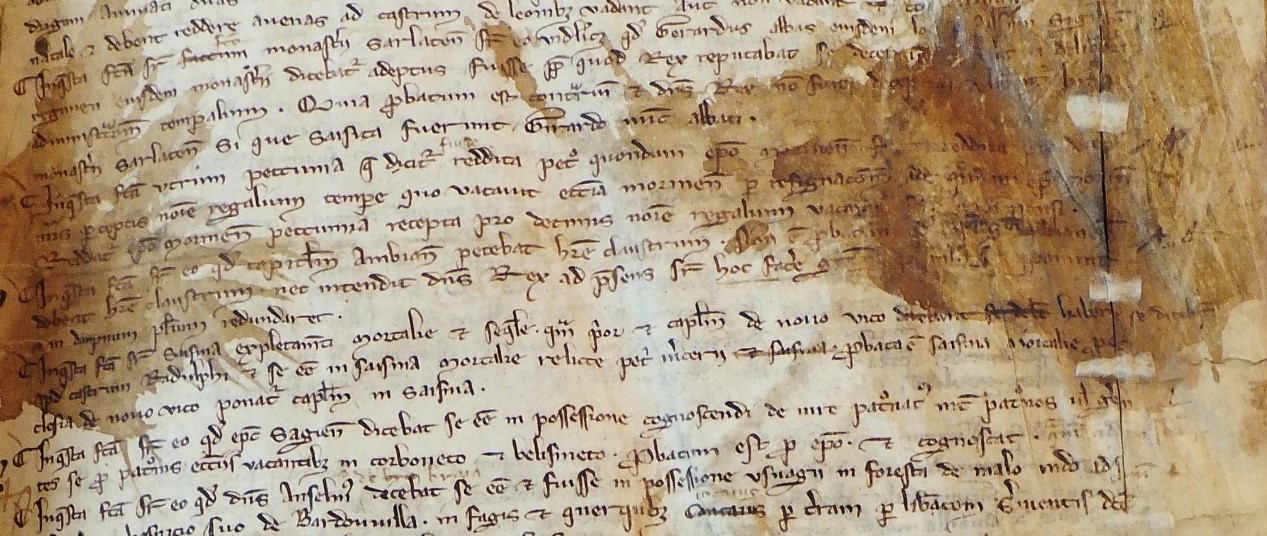Records of crime and disputes offer us some of the most intriguing insights into the premodern past. As one of the few types of source material which purports to record the actual speech and behaviour of individuals, they can seem to speak to us directly from the page — an illusion which sparked fascination with early microhistorical classics such as Montaillou, but which has subsequently prompted the emergence of a more cautious historiography engaged with their methodological challenges. Over the last thirty years a growing body of work has continued to demonstrate the enormous potential of court records for numerous avenues of enquiry, whether into practices of memory, gender, subjectivity, emotion, vengeance, feuding, honour, the history of legal institutions, and others.
This Special Collection brings together an international group of scholars at various stages of their career working on all aspects of late medieval court records, whether secular or ecclesiastical, with an interest in methodological issues pertaining to them. Questions we seek to pursue include: how do we define and access the truths or realities presented through records of disputes and crime? How did contemporaries use these documents to interact with each other, to create truths and to shape the reality of the world around them? And how should historians approach the images they present us with?
This Special Collection is guest edited by Dr. Frans Camphuijsen, University of Amsterdam and Dr. Jamie Page, Eberhard-Karls-Universität Tübingen.
Image: Detail from the first Olim-register of the Parlement de Paris, 1254-1273 Credit: Archives Nationales, X1A1, fol. 3 Photo: Frans Camphuijsen
Editorial
Introduction: New Approaches to Late Medieval Court Records
Frans Camphuijsen and Jamie Page
2019-11-29 Volume 5 • Issue 1 • 2019 • 69
Also a part of:
Special Collection: New Approaches to Late Medieval Court Records
New Approaches to Late Medieval Court Records
Criminalising Animals in Medieval France: Insights from Records of Executions
Lesley Bates MacGregor
2019-02-26 Volume 5 • Issue 1 • 2019 • 15
Also a part of:
Special Collection: New Approaches to Late Medieval Court Records
Between Courtoom and Castello: A Tuscan Dispute’s Social and Procedural Profile
Joseph Figliulo-Rosswurm
2019-02-26 Volume 5 • Issue 1 • 2019 • 16
Also a part of:
Special Collection: New Approaches to Late Medieval Court Records
Legal Ephemera in the Ecclesiastical Courts of Late-Medieval England
Tom Johnson
2019-02-26 Volume 5 • Issue 1 • 2019 • 17
Also a part of:
Special Collection: New Approaches to Late Medieval Court Records
Penitential Themes in 14th-Century Sienese Petitions for Amnesty: How Can They Contribute to the Debate on the ‘Voices’ of Medieval Court Records?
Lidia Luisa Zanetti Domingues
2019-04-02 Volume 5 • Issue 1 • 2019 • 24
Also a part of:
Special Collection: New Approaches to Late Medieval Court Records
Afterword: Court Records and the Growth of States 1100–1800
Ian Forrest
2019-11-21 Volume 5 • Issue 1 • 2019 • 66
Also a part of:
Special Collection: New Approaches to Late Medieval Court Records
Special Collections
-
Diversity and Competition within the Latin Church: The Secular-Mendicant Controversy and its Long Aftermath (13th–20th Centuries)
Thinking the Political: Theory, Literature, Practice
Poetry Off the Page: Intersecting Practices and Traditions in British Poetry Performance
Humour as a Human Right
Cultural Heritage Data for Research: Opening Museum Collections, Project Data and Digital Images for Research, Query and Discovery
Literature as Imaginary Archive: Ephemera and Modern Literary Production
Caliban's Mirror: Reflections of James Joyce and Oscar Wilde
Cultural Representations of Machine Vision
The Public Curatorship of the Medieval Past
Medieval Minds and Matter
Representing the Medieval in Popular Culture: Remembering the Angevins
The Politics and History of Menstruation: Contextualising the Scottish Campaign to End Period Poverty
Production Archives 03: Archival Practices
Production Archives 02: Production Contexts
Production Archives 01: Puppets for Action
Representing Classical Music in the Twenty-First Century
The Pathological Body: European Literary and Cultural Perspectives in the Age of Modern Medicine
Binary Modernisms: Re/Appropriations of Modernist Art in the Digital Age
Local and Universal in Irish Literature and Culture
Reading in Ruins: Exploring Posthumanist Narrative Studies
The Language of Perspective
Nancy Astor, Public Women and Gendered Political Culture in Interwar Britain
The Working-Class Avant-Garde
Colonialities in Dispute: Discourses on Colonialism and Race in the Spanish State
Powering the Future: Energy Resources in Science Fiction and Fantasy
Writers and Intellectuals on Britain and Europe, 1918–2018
Literature, Law and Psychoanalysis
Muslims in the Media
Encounters between Asian and Western Art in the 20th and 21st centuries: a liberating influence for Asia?
Waste: Disposability, Decay, and Depletion
Pride Revisited: Cinema, Activism and Re-Activation
New Approaches to Late Medieval Court Records
Utopian Art and Literature from Modern India
Right-Wing Populism and Mediated Activism: Creative Responses and Counter-Narratives
Representing Climate: Local to Global
Cultivating Spheres: Agriculture, Technical Communication, and the Publics
Freedom After Neoliberalism
The Medieval Brain
Remaking Collections
New Approaches to Medieval Water Studies
Imaginaries of the Future 01: Bodies and Media
Imaginaries of the Future 02: Politics, Poetics, Place
Imaginaries of the Future 03: Utopia at the Border
Postcolonial Perspectives in Game Studies
Station Eleven and Twenty-First-Century Writing
#Agreement20
What’s Left? Marxism, Literature and Culture in the 21st Century
New Voices in Jewish-American Literature
Authors, Narratives, and Audiences in Medieval Saints’ Lives
From TV To Film
American Literature & the Transnational Marketplace
Mnemosyne
Healing Gods, Heroes and Rituals in the Graeco-Roman World
The Abolition of the University
